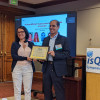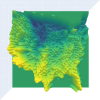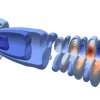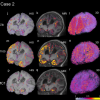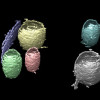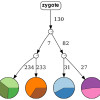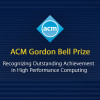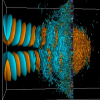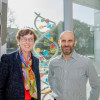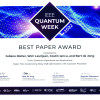News Center
Berkeley Lab Computing Sciences Takes Novel Approach to Science Workforce Development and Diversity
The Sustainable Research Pathways (SRP) program has been connecting students from underrepresented communities and institutions to scientists and staff at Berkeley Lab for nearly a decade to facilitate research collaborations and bolster workforce development and diversity, equity, and inclusion. Read More »
Berkeley Lab’s Novel Method for Modeling Fluids at the Mesoscale
Recently, Berkeley Lab researchers developed a continuum FHD model that efficiently harnesses the power of cutting-edge exascale supercomputers to simulate the transport phenomenai n fluid mixtures. Read More »
Quantum-Inspired Artwork Unveiled
For World Quantum Day on April 14, Berkeley Lab’s Computing Sciences Area celebrated the interdisciplinary collaboration between the Advanced Quantum Testbed (AQT) at Berkeley Lab and the California-based contemporary visual artist Benjamin Arizmendi. Read More »
Quantum Evolution
A leading expert in quantum computing, Bert de Jong discusses why quantum computing matters, where it is today, and the potential of this emerging technology to change science. Read More »
Berkeley Lab Researchers Awarded ISQED’23 Best Paper
The International Symposium on Quality Electronic Design (ISQED’23) recognized researchers in Lawrence Berkeley National Laboratory’s (Berkeley Lab’s) Computer Architecture Group with a Best Paper Award for “An Area Efficient Superconducting Unary CNN Accelerator.” Read More »
New Math Methods and Perlmutter HPC Combine to Deliver Record-Breaking ML Algorithm
Using the Perlmutter supercomputer at the National Energy Research Scientific Computing Center (NERSC), researchers at Lawrence Berkeley National Laboratory (Berkeley Lab) have devised a new mathematical method for analyzing extremely large datasets – and, in the process, demonstrated proof of principle on a record-breaking dataset of more than five million points. Read More »
Improving Training for Scientific Machine Learning
In the world of scientific machine learning (SciML), scientists are beginning to embrace the use of neural networks as a way to accelerate simulations. At the heart of deep learning algorithms, neural networks provide a mechanism to encode complex dependency structures, using many connected node layers to transform data into learned features to be used for a wide range of scientific tasks. Read More »
The Most Advanced Bay Area Earthquake Simulations Will be Publicly Available
A collaboration involving scientists and computing resources from Berkeley Lab and the simulation software EQSIM is releasing the most accurate and detailed earthquake simulations to date, which will initially capture earthquake motions across the San Francisco Bay Area and later expand to other regions. Read More »
WarpX Code Shines at the Exascale Level
The WarpX project has spent the last six years creating a novel, highly parallel, and highly optimized single-source simulation code for modeling plasma-based particle colliders on cutting-edge exascale supercomputers, with broad importance for other accelerators and related problems. Read More »
Berkeley Lab’s Ushizima Honored with PMWC Pioneer Award
Berkeley Lab’s Daniela Ushizima was recognized with PMWC Pioneer Award for constructing “a new and reliable technique for diagnosing Alzheimer’s disease and measuring the efficacy of experimental treatments.” Read More »
Berkeley Lab Scientists Create Machine Learning Pipeline for Interpreting Large Tomography Datasets
A group of Berkeley Lab scientists has developed and tested several machine learning techniques organized in a learning pipeline to improve the interpretation of increasingly large cryo-ET datasets. Read More »
The SciData Division’s Jean Luca Bez Receives BSSw Honorable Mention
Jean Luca Bez, a postdoctoral scholar in the Scientific Data Management Research (SDMR) group was recognized with an Honorable Mention by the Better Scientific Software (BSSw) Fellowship Program. Read More »
Bert de Jong Named 2023 Oppenheimer Fellow
Bert de Jong has been selected as a 2023 fellow of the Oppenheimer Science and Energy Leadership Program (OSELP). Read More »
Berkeley Lab’s Networking Middleware GASNet Turns 20
For 20 years, Berkeley Lab’s GASNet has been fueling developers’ ability to tap the power of massively parallel supercomputers more effectively. The middleware was recently upgraded to support exascale scientific applications. Read More »
HUNTRESS: A Step Forward for Computational Oncology Data Analysis
The latest developments in computational oncology are giving medical researchers a glimpse into a future where they’ll be able to understand tumor progression via supercomputers and advanced mathematical algorithms. Read More »
SCGSR Fellow Brings Astrophysics Data Skills to Berkeley Lab and Black Holes
Graduate student Peter Craig spent much of 2022 working with researchers in the Berkeley Lab Applied Mathematics and Computational Research division scouring through a new, massive astrophysics dataset looking for previously unidentified binary black holes. Read More »
Berkeley Lab-Led WarpX Project Key to 2022 Gordon Bell Prize
A Berkeley Lab research team and international collaborators were awarded the prestigious ACM Gordon Bell Prize on November 17 during SC22. Read More »
Stefan Wild to Lead Berkeley Lab’s Applied Mathematics and Computational Research Division
Stefan Wild has been selected to serve as the next director for Berkeley Lab's Applied Mathematics and Computational Research (AMCR) Division in the Computing Sciences Area (CSA). Read More »
Berkeley Lab Scientists Win IEEE LDAV Best Paper Award
Berkeley Lab scientists were honored with a Best Paper Award by the IEEE Large Scale Data Analysis and Visualization (LDAV) symposium. Their paper, Distributed Hierarchical Contour Trees, discusses their development of a powerful tool for data analysis. Read More »
Meet Helen Xu, 2022 Hopper Fellow
Helen Xu begins her role as Berkeley Lab’s new Grace Hopper Fellow. Established in 2015, this prestigious fellowship aims to develop young computer and computational scientists to make outstanding contributions to HPC applications. Read More »
Five CS Staff Honored With Berkeley Lab Director Achievement Awards
Five Computing Sciences Area employees will accept the Director’s Award for Exceptional Achievement at a ceremony on November 10. The CS Area award recipients are David Brown, Marcus Noack, Talita Perciano, Silvia Crivelli, and Michael Wehner. Read More »
Exabiome Brings Metagenomics Into the Exascale Era
Over the past seven years, the Berkeley Lab-led Exabiome project developed novel software tools that allow researchers to harness the power of cutting-edge high performance computers (and now exascale supercomputers) to solve previously infeasible problems in metagenomics. Read More »
GraphBLAST Targets GPU Graph Analytics Performance Issues
GraphBLAST, a new graph framework developed by researchers at Berkeley Lab and UC Davis, enhances the performance of the popular GraphBLAS collection of graph algorithm building blocks by overcoming design and performance challenges specific to graphical processing units (GPUs). Read More »
Berkeley Lab Researchers Honored with Best Paper Award at QCE22
For the third year running, Berkeley Lab researchers snagged the IEEE International Conference on Quantum Computing and Engineering (QCE22) Best Paper award. Read More »
Scientific Data Division Summer Students Tackle Data Privacy
Two students, Ammar Haydari and Nikhil Ravi, worked with Scientific Data Division's Sean Peisert on mobility data and electrical grid data privacy projects. Read More »













